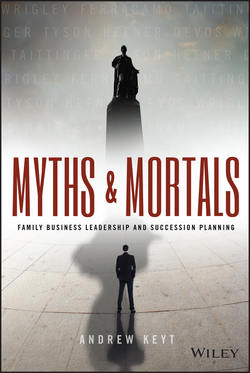Читать книгу Myths and Mortals - Keyt Andrew - Страница 11
На сайте Литреса книга снята с продажи.
Prologue: Born in the Shadows
It Takes a Personal Vision
ОглавлениеThe work of differentiation leads to inner illumination, as the successor, no longer eclipsed by the shadow of a legendary founder, begins to find out who she is and what she wants. The inner light of knowing one's self shines outward and becomes the source for developing a personal vision.
To know one's self is to recognize the humanity of those leaders who led before, as well as the humanity of those within the family and the business. Generative successors perpetuate the family legacy as they understand that their legendary predecessors were mortals with a heroic stripe. Given their flaws, the heroism of founders and their predecessors is all the more remarkable.
Bill Wrigley reflected this understanding when he introduced the motto, “Respect the past, but always do what's right for the future.” This was born out of his recognition that while many of the traits of his father's leadership were core to its success, they may not serve the company well moving forward. His father's drive and authority were why the company grew during an era following the great world wars.
But to lead the company into a rapidly changing global environment, Bill realized he would have to reengineer the organization, and “do what's right for the future.” This is where values meet vision, and successors must craft their own personal vision for the future to carry family values forward, rather than merely emulating what their parents did.
Defining one's success, independent from the way parents, family, and the community define it, is critical in differentiated leadership. What distinguishes successful successors in family businesses is their ability to respect and understand the past, while charting their own path, even in the face of resistance. The strength for defining one's own success comes from the hard work of separation, stepping out of the shadows of the myth: “I am not who my parents or anyone else want me to be.” The leader's vision is formed both by traits shared with his or her parents and traits foreign to them. Leaders who embrace both establish a unique identity. They achieve personal authenticity and political credibility, foundational to establishing a vision of success.
A personal vision is the door that swings between internal and external credibility.
Later in this book we will examine how successors establish confidence in themselves and credibility with others. My research will show that family business leaders who succeed differentiate by building self-awareness, building a belief in themselves, and building the belief in others that they can be credible and generative leaders. This process leads successors to develop a rudder of conviction based on a clear sense of passion and values. Vision then leverages this inner work and turns it outward to the world. Successors have paid their dues; vision pays it forward. Vision is more than how one sees the world. It is also how the world sees a person as he projects himself to the world.
True vision is the extension of one's true self, how leaders serve their core convictions, so others know what matters to them.
Strong leaders can pursue those convictions in the most unlikely of circumstances. Christie Hefner wanted to work on Capitol Hill, but she altered her career trajectory to work at Playboy Enterprises. As different as she was from her father, Hugh Hefner, Christie was able to lead Playboy alongside him. He was its personae, and she was its voice. “I wasn't interested in being a personality, or, God forbid, a celebrity,” Christie says. “I had to chart my own course. As different as my father and I are, he is authentic and true to himself, and I needed to be authentic and true to myself.” The hard work of establishing internal credibility converges into a personal vision of success that makes the business more successful in achieving its mission.
